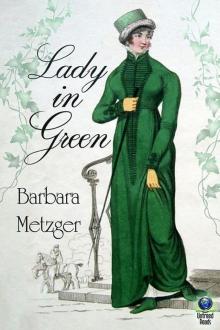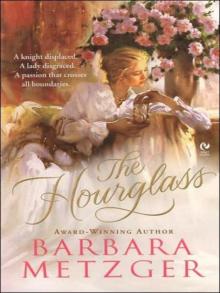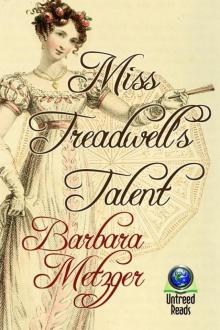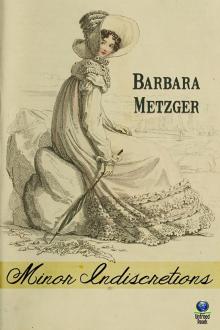- Home
- Barbara Metzger
The Scandalous Life of a True Lady Page 2
The Scandalous Life of a True Lady Read online
Page 2
“What a shame you have wasted all this for so long. That hair, those eyes… But yes, you just might do, and we both might profit. I have a gentleman in mind.”
“A client?”
“A patron if you will, but more a friend. He helped me start my business so I owe him a favor. He expressed a need for a female to accompany him to a house party at a country estate. None of my ladies is respectable enough.”
“He would bring his mistress to a house party?”
“It’s a bachelor gathering for the swells. They’re bringing their own entertainment from Town.”
Simone started to gather her hair up again. “An orgy? I will not—”
Mrs. Burton laughed. “Gracious, no. You must have been listening to your landlady, that old biddy. My, ah, friend would not take part in anything that scandalous. Not since he’s come of age, anyway. Nor would some of the other guests, from what I hear. Government types and businessmen, with reputations to uphold, don’t you know. As far as the neighbors will see, this party will be as polite as a debutante ball, without chaperones, of course. Another old friend of mine will act as hostess. She’s been Lord Gorham’s mistress for the past ten years, at least.”
“It sounds…lovely.”
“Well, it is a few days only, and nights, naturally. But if you please my friend, who knows but he might keep you on. He is generous.”
Now that truly did sound lovely. “If he is generous, I shall make sure I please him.”
“That’s the ticket, dearie. Just be honest.”
If Simone were honest, she’d admit her knees were knocking together at the very prospect.
Mrs. Burton was going on: “If it doesn’t work out, you come on back. With proper clothes and a bit of training, you could make a lot of money right here.”
“I’d rather try to find a wealthy protector, ma’am. No offense. But a house, jewels I could sell, a bit of security for the future, that’s what I want.”
“Don’t we all, dearie. Don’t we all.”
Chapter Two
After a few more questions, Mrs. Burton rose to cross to her cluttered desk. “Help yourself to more biscuits while I send a note to Harry,” she told Simone as she pulled a sheet of paper closer. “The gentlemen like a female to have a bit of meat on her bones.”
The madam filled her delicate chair and her bodice in ways Simone never hoped to. She did hope the woman’s old friend approved of her, despite her lack of soft curves and billowy bosoms. The house party sounded like a distinguished gathering, one that might even offer other avenues of employment. Who knew but some nobleman’s mistress had a misbegotten child that needed a governess? Simone could not afford to miss the chance. Besides, Mrs. Burton’s patron must be intelligent and well-mannered if he demanded the same in his companion. From what the older woman said, Simone suspected he was of middle years, no randy youth or rakish, hardened town buck. He’d know she was inexperienced from the letter being written, so his expectations could not be too high. How low was too low? Simone’s education had serious gaps, especially when it came to questions of what a man expected for his money, and how much money was involved anyway.
For that matter, Simone realized she should have come to terms with Mrs. Burton first, to agree on who got what share of the gentleman’s largesse. Simone needed the coins more, and she’d inherited more than black eyes from the horse-trading grandfather she’d loved as a child. It would never do to offend the woman, though, not before the letter was sent. Mrs. Burton might decide Simone was not biddable enough for her efforts, or too mercenary for an aristocrat’s mistress. Members of polite society, Simone knew, believed discussions of money matters to be crass. Which, she supposed, was why so many of them landed in dun territory or debtor’s prison, and why so many of their merchants’ bills went unpaid. Did such foolish conventions hold among light-skirts and their protectors? Simone could not afford such nicety in her dealings. Why, she might have to ask the gentleman for an advance on her pay, if he expected her to dress the part of a highly paid courtesan.
Simone had to laugh at herself, counting her chickens before the rooster arrived. He might decide she was too old, too plain, too unskilled, too unsophisticated to be his paramour. The doorman had not thought she had the proper—or improper—qualities. Neither did the women who peeked into the open door, then giggled. Their hair was prinked in ringlets, their breasts pushed over the low-cut bodices, and their skirts shortened to show a bit of lace petticoat or silk stockings. No, Simone did not look like one of them and never had, not even when her family was in funds.
Mr. Harry had not hired any of them, she reminded herself again for confidence, taking another biscuit. In case he did not like her, or like what Mrs. Burton wrote, at least her belly would be full.
Men were interested in her. Otherwise she would not be in this fix, unless males commonly assaulted any female to cross their paths. No, no one had tried to take advantage of her in Oxford, under her parents’ roof. Why, her own beau, the suitor she thought she’d marry when he established himself in his career, had never tried to steal a kiss. Too bad she had not aroused in him the same ardor some of her employers had shown. Then the young curate might have wed her despite her lack of dowry.
Simone could not decide if she actually wanted to be the object of this Harry’s passions. If he did not hire her—or did not reply to Mrs. Burton’s note—then she was not a fallen woman, unless her landlady had seen her cross the street. Surely in all of London there was an employment agency that did not require references. Or some old bat so difficult no one else would work for her. Simone could try harder to find a post. Maybe Mrs. Olmstead would let her clean the house in exchange for rent. Maybe Mr. Fordyce downstairs needed a secretary. Simone quickly dismissed that idea. But maybe Mrs. Burton would pay her to instruct the women here. After all, if none were acceptable for a genteel house party, they ought to be taught, to attract a higher class of customer. That was a far better plan.
Simone almost interrupted Mrs. Burton’s pen scratching. But what if men wanted their women ignorant and silly and soft? This house obviously was a success, with just such fluffy wares for sale. There was nothing frothy about Simone, not a curl, not a frill, not a giggle.
And she had no heart for the transaction she was contemplating. She reached for her black cloak. Then she remembered her brother and sank back on her cushioned chair. The biscuits were all gone, along with her choices.
Mrs. Burton rang a little bell on her desk and the beefy doorkeeper came, as if he’d been waiting nearby to come to her aid. “See that this is delivered to Harry, George. If you bring it to McCann’s Club, they’ll know where to find him. I’ll be waiting for an answer.”
George looked at the folded sheet, then at Simone. “Harry?” Disbelief resounded in his voice.
Mrs. Burton waved him on his way with one beringed hand. “By the time our Harry arrives, he’ll be pleased.”
George still seemed dubious, so Simone’s hopes—if hope they were; she was still undecided—sank. “I should go back home and wait there.”
Mrs. Burton brushed that aside too. “What, would you have me bring Harry to Mrs. Olmstead’s? Should we discuss your business in her front parlor, which I’d wager is dark and dreary?”
The woman was right on all counts. Mrs. Olmstead would have apoplexy to see Lydia Burton on her doorstep, much less with Simone’s prospective lover in tow. She’d die of outrage, then Simone would have another sin on her head. “Heavens, no. But you could send for me. Or I could watch out of my window.”
“Hm. That might be better. Then Harry and I could settle the finances right off. You wouldn’t want to be haggling over pounds and pence the minute you meet him. I’ll take care of that business for you.”
Simone was not quite sure she trusted the gleam in Mrs. Burton’s eyes, a gleam that matched the diamonds in her ears and on her wrists. Simone might sacrifice her scruples, but she meant to hold tight to her wits. Let a bawdy house madam settle he
r fees, and perhaps keep more than her fair share for making the introduction? Not likely. “You said Mr., ah, Harry, was generous. I think we should see if we suit, first, before worrying over the money.”
“You’ll suit. I’ll see to it. One of the girls must be about your size. Come.”
Simone was supposed to wear the trappings of a prostitute? Oh, dear. “I do not wish to appear too…too…” She could not think of a word that would not offend her hostess.
“Fast? Loose?” Mrs. Burton supplied, frowning. “Immoral?”
The unknown Harry would know she was a fallen woman by her presence here. Simone did not want to appear cheap or tawdry. Her intention was to command a substantial fee. She settled on “Unladylike.”
“Of course not. Harry is particular. Otherwise any of my girls might have done well enough. We’ll find something suitable, never fear.” She sniffed. “And anything would be better than what you have on. I suppose all of your gowns are fit for the trash bin?”
“For the schoolroom. I do have one silk gown for dinner, but it is grey.” And shapeless and adorned with a single frayed ribbon.
“We wish to impress Harry, not depress him. Come on now. There is much to be done.”
Like making a silk purse out of a cow’s ear, Simone would have thought it impossible, until she saw the results. Lydia Burton was not simply a businesswoman or a matchmaker; she was a fairy godmother. She waved her wand—her glittering hand, at any rate—and miracles happened.
Watching herself being transformed, Simone worried if they were all wasting their time and efforts. “What if he doesn’t come?”
“Oh, he will. Harry knows I would not bother him without good reason. Besides, he is not half as busy now that the war is over.”
“He works with the army, then? The government? Or does he deal with supplies or shipping?”
Mrs. Burton bit her lip as she supervised Simone’s new hair style. “He’ll tell you what he wishes you to know. Gentlemen cherish their secrets and their privacy. You must remember that, Miss Ryland, above all in this business. What is spoken in private must stay private. Do you understand?”
“Of course.” And not at all. Weren’t the girls rushing to do the madam’s bidding gossiping about their latest patrons? Simone assumed there were different rules for becoming a mistress.
Someone produced a gown that Mrs. Burton deemed acceptable, but it was too long for Simone, too wide around, too gaping at the collar. An older woman quickly fetched pins and needles and thread.
“I cannot pay you,” Simone told her. “Or any of you, for the loan of the gown, the alterations, the help with my hair.”
“Oh, we’d do anything for our Harry,” one of them answered, and they all agreed.
He was a favorite of the house, it seemed. Simone was not sure if that was good or bad either. Obviously he was a womanizer, not likely to keep a steady mistress. Just as certain, he was a friendly fellow, polite to all classes, and considerate. He’d brought this woman ribbons for her new bonnet, sent a message to that one’s brother, sent a homesick girl back to the country, and delivered medicine when anyone fell ill. He always brought sweets when he came, and often read novels to the girls when they were not busy. Why, the man sounded like a veritable paragon—except that this was a brothel, not a charity home.
When Simone started to ask more about him, his age, his looks, his likes and dislikes, Lydia clapped her hands. “Privacy, ladies, privacy.” She meant Harry’s, not Simone’s, who was poked and prodded and perfumed. “Let us leave Miss Ryland to form her own opinions. It is the impression she will make on Harry that we are concerned about, not the other way about.”
Soon the lovely gown was raised over her head again, and over her plain mended shift.
Mrs. Burton frowned but did not insist Simone disrobe completely. “No one will be seeing that today, thank goodness.”
The gown was a dark vibrant blue watered silk. The color matched Harry’s eyes, Molly swore. Harry’s eyes were more like sapphires, Susie said, although she’d only seen paste copies of the gems. Nell declared Harry’s eyes were prettier than any jewel, because of the dark rims around the blue, and because they sparkled so when he laughed.
Simone relaxed a bit. The man sounded charming. She might even like him, which was far more than she’d expected.
The gown’s neckline was far lower than she’d expected. The borrowed corset forced her breasts higher than she was used to, but now the gown looked as if it were made for her, and she was made for a man’s admiration. She did not object. No one would have listened, for one thing, and she wanted to win Harry’s approval, for another.
Her hair was loosely gathered instead of in its tight braids, twirled into fashion with a curling iron, and held up with a bouquet of silk violets Meg volunteered.
“Lord Maynes couldn’t keep his regular appointment. His wife was in town, so he sent these instead.”
Everyone laughed except for the madam, who chided them again. “Privacy, girls.”
Then Jenny brought out a tray of cosmetics.
Face paints? “Oh, I could not use—”
The job was done before Simone finished the sentence. A blush of color on her almond skin highlighted her prominent cheekbones and made her coloring seem sun-kissed instead of swarthy; a dark line around her eyes made them look wider and mysterious, instead of just somber; an ashy substance seemed to make her lashes longer; polish disguised the rough treatment her fingernails had recently undergone. Lydia fixed a strand of pearls around Simone’s neck and declared them just the proper touch for a well-bred miss. “Nothing garish, mind. Harry would not want that.” Then she bade Simone stand and walk across the room.
Simone took one step before her fairy godmother cursed and clutched her heart. “By Satan’s short hairs, she is wearing blasted boots!”
Five girls ran to find slippers to fit.
Then Simone walked the way her mother had taught her: back straight, chin high, in smooth, graceful steps.
“Ooh, don’t she look like a lady for true?”
Lydia poured them each a glass of wine in celebration. “Let us hope so, for Harry’s sake.”
Chapter Three
“To Harry!” someone cheered.
“And to Miss Ryland, for luck,” another woman added, so Simone raised her glass to them all. “To new friends and good fortunes.”
“Especially the good fortunes,” Mrs. Burton added.
George the butler cleared his throat at the door to the proprietor’s private parlor, then entered and whispered in her ear.
“Major Harrison is coming? Drat the man. I was hoping for—” Lydia caught herself from saying more and clapped her hands to get the girls’ attention. “Privacy, my dears. You know how Major Harrison feels about his personal life. I am sure you have chores to do to ready yourselves for this evening. Meg, your singing voice needs practice. Sally, your hair appeals dull. Some lemon juice, perhaps?”
In minutes they were all gone, with the jars and sewing baskets and extra slippers.
Simone set her glass down. “Someone else is coming? I was quite getting used to the idea of Harry. He sounded a pleasant sort.”
“Oh, he is, and that’s our Harry. Major Harrison. I wish he could cease—” She stopped herself again. “Oh, well, he is coming within the hour.”
Simone wished the madam had completed the sentence. At least now she knew that Harry was a military man, an officer and a gentleman. He was well off if he’d purchased the rank, courageous if he’d earned it on the field of battle. Like many other officers, he would most likely resign his commission now that Napoleon was finally defeated, unless he was old enough to have fought long ago or had a desk job in London. Or he might have been injured during the war and retired on half-pay, which would not serve Simone’s purposes at all. What if he were scarred or maimed and that was why he could not find a willing woman for himself? Oh, dear. Then there were commanding officers who were martinets, used to having their e
very order obeyed. Oh, dear, oh dear.
She must have moaned aloud for Lydia refilled her wine glass. “Don’t worry,” she said, mistaking the source of Simone’s distress. “Harry will be pleased. I am certain of that, especially if you remember one important thing.”
“I know, to respect his privacy.”
“Two things, then. His privacy and his demand for honesty. Harry is the most accommodating fellow in England, but he cannot abide lies. Just tell him the truth, and you’ll do fine.”
Tell him the truth, that she was terrified, mortified, and unqualified? Simone groaned.
“You are not going to swoon, are you?”
“I never have before,” Simone answered. Of course she’d never been a member of the frail sisterhood before, nor been on display in borrowed finery for a gentleman’s approval, like a horse at Tattersall’s. She swallowed the contents of her glass for courage. Her French grandmother had fled to England with her Gypsy horse-trader; her mother had eloped with a Latin scholar whose family disapproved. Simone swore to be brave like them, a woman making her own way in the world.
…A woman whose knees were knocking together loudly under her borrowed silk skirts.
No, that wasn’t the sound of her bones rattling; it was the sound of a cane tapping down the hallway. Good grief, he was blind! No again, for Mrs. Burton would not have insisted on the face paints if Harry couldn’t see.
Either a century or a second later, Simone was too addled to notice which, George opened the door, bowed, and announced “Major Harrison, ma’am.”
“Very impressive, George,” came from behind him, the guest being hidden from view by George’s bulk. “No one would know you were a prizefighter in an earlier life.”

 My Lady Innkeeper
My Lady Innkeeper The Scandalous Life of a True Lady
The Scandalous Life of a True Lady Lady in Green
Lady in Green An Angel for the Earl
An Angel for the Earl Truly Yours
Truly Yours Bething's Folly
Bething's Folly The Christmas Carrolls
The Christmas Carrolls The Hourglass
The Hourglass Miss Treadwell's Talent
Miss Treadwell's Talent A Loyal Companion
A Loyal Companion Love, Louisa
Love, Louisa Minor Indiscretions
Minor Indiscretions Jack of Clubs
Jack of Clubs An Enchanted Christmas
An Enchanted Christmas Lady Sparrow
Lady Sparrow Miss Westlake's Windfall
Miss Westlake's Windfall Autumn Glory and Other Stories
Autumn Glory and Other Stories Greetings of the Season and Other Stories
Greetings of the Season and Other Stories A Perfect Gentleman
A Perfect Gentleman